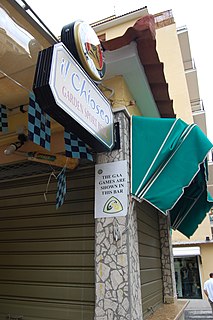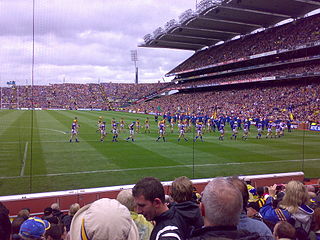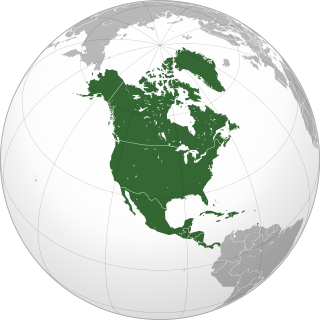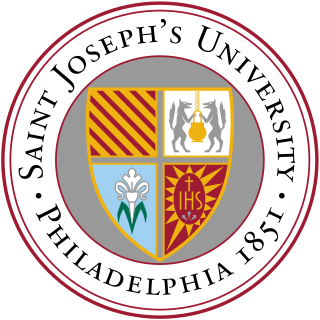The Western Divisional Board of the North American Gaelic Athletic Association (GAA) colloquially San Francisco GAA is the governing body of hurling, camogie, and Gaelic football in the San Francisco Bay Area. It is affiliated to the North American Board.

The Antrim County Board of the Gaelic Athletic Association or Antrim GAA is one of the 32 county boards of the GAA in Ireland, and is responsible for Gaelic games in County Antrim. The county board is also responsible for the Antrim inter-county teams.

The Derry County Board of the Gaelic Athletic Association (GAA) or Derry GAA is one of the 32 county boards of the GAA in Ireland. It is responsible for gaelic games in County Londonderry in Northern Ireland. The county board is also responsible for the Derry inter-county teams.
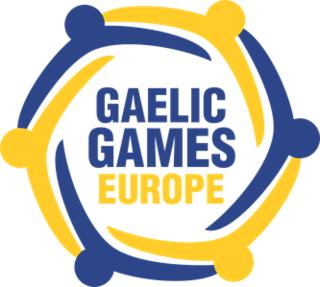
The European Board of the Gaelic Athletic Association (GAA) or Gaelic Games Europe is one of the international units of the GAA, and is responsible for organising Gaelic games in continental Europe. Gaelic Games Europe is also responsible for the European Gaelic football, hurling, camogie and ladies' Gaelic football teams which compete every three years at the GAA World Gaelic Games.
Connacht GAA or formally the Connacht Provincial Council of the Gaelic Athletic Association is the governing body for Gaelic games that are played in the province of Connacht, Ireland. It performs a supervisory and appeal role for the five County Boards within the province. Anomalously, it also exercises its functions for an additional two County Boards that are not located in the province: London GAA and New York GAA. Teams from these administrative areas play in the Connacht Senior Football Championship.
The Ulster Council is a Provincial council of the Gaelic Athletic Association sports of hurling, Gaelic football, camogie, and handball in the province of Ulster. The headquarters of the Ulster GAA is based in Armagh City.
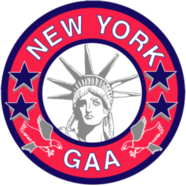
The New York County Board of the Gaelic Athletic Association, or New York GAA, is one of the county boards of the Gaelic Athletic Association outside Ireland, and is responsible for Gaelic games in the New York metropolitan area. The county board is also responsible for the New York inter-county teams.

Cappagh is a Gaelic Athletic Association (GAA) club in County Kildare, Republic of Ireland. It was the Kildare club of the year in 1998.

The Continental Youth Championships (CYC) is an annual weekend tournament of Gaelic football, hurling, and camogie organized by the Gaelic Athletic Association. It is contested by teams from the USA and Canada, and is a separate competition from the existing youth championships in the New York, Canadian, and NACB areas. It began in 2004, and its location rotates around various cities from year to year. The age of players ranges from Under 8 to Under 18.
The Central Divisional Board of the North American GAA is the governing body of hurling, camogie, and gaelic football in an area centered on Chicago. It is affiliated to the North American Board, and its territory was expanded in 2006 to include Milwaukee. Its headquarters are at Gaelic Park, a custom built facility for Gaelic games in the South side of Chicago. The facility has hosted major tournaments such as the North American playoffs. It hosted the 2007 Continental Youth Championships and the 2007 North American Playoffs.
The Montreal Shamrocks GAC is a sports club in Montreal, Canada, associated with the Gaelic Athletic Association in Ireland. They operate under the Canadian GAA board(Eastern Canada division).
Although many hurling clubs exist worldwide, only Ireland has a national team. Ireland's national hurling team and the Scotland shinty team have played for many years with modified match rules in international composite rules—much like international rules football brings together Gaelic football and Australian rules football. This match is the only such international competition.
The Northeast Divisional Board of the USGAA is the governing body of hurling, camogie, and Gaelic football in the Boston metropolitan area of Massachusetts. It is affiliated to the USGAA, and is the largest division in the USGAA. Its headquarters are at the Irish Cultural Center (ICC) in Canton, MA, a facility that has hosted many major tournaments over the years such as the North American Playoffs, the Martin Donnelly Interprovincial Championship, the Continental Youth Championship, and many more.
The following is an alphabetical list of terms and jargon used in relation to Gaelic games. See also list of Irish county nicknames

Erin go Bragh GAA are a Dublin-based Gaelic Athletic Association club based in Clonee, Littlepace/Castaheaney/Ongar district in Dublin 15. The club currently field 1 teams in junior football, 1 junior hurling team and 1 camogie team. They also have a boys and girls juvenile section fielding from Under 8-minor in football, hurling and camogie. There is also a club of the same name based in Warwickshire, England.

Padraig Pearses GAA Club is a Gaelic Athletic Association club located in the parishes of Moore, Taughmaconnell and Rural Creagh in South County Roscommon, Ireland. They play in Red and White colours and their home pitch is at Woodmount, Ballinasloe.
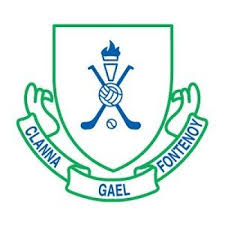
Clanna Gael Fontenoy is a Gaelic Athletic Association club based at Ringsend, Dublin, Ireland, serving Sandymount, Irishtown, Ringsend and its surrounding areas.
The Hurling Club of Madison is an American amateur sports club based in Madison, Wisconsin, playing and promoting the sport of hurling. Since 2015, the club has also sponsored a Gaelic football team, adding a women's Gaelic football team in 2016. The club is a member of the United States Gaelic Athletic Association, Heartland Division.
Thomas McCurtains is a Gaelic Athletic Association club based in Goodmayes, East London. The club covers a wide area and current players live in many different areas, including, Gants Hill, Woodford, Leyton, Leytonstone, Stratford, Romford, Dagenham, Brentwood & Chelmsford as well as many other areas. The club was founded in 1920 making it one of London's oldest GAA clubs.


